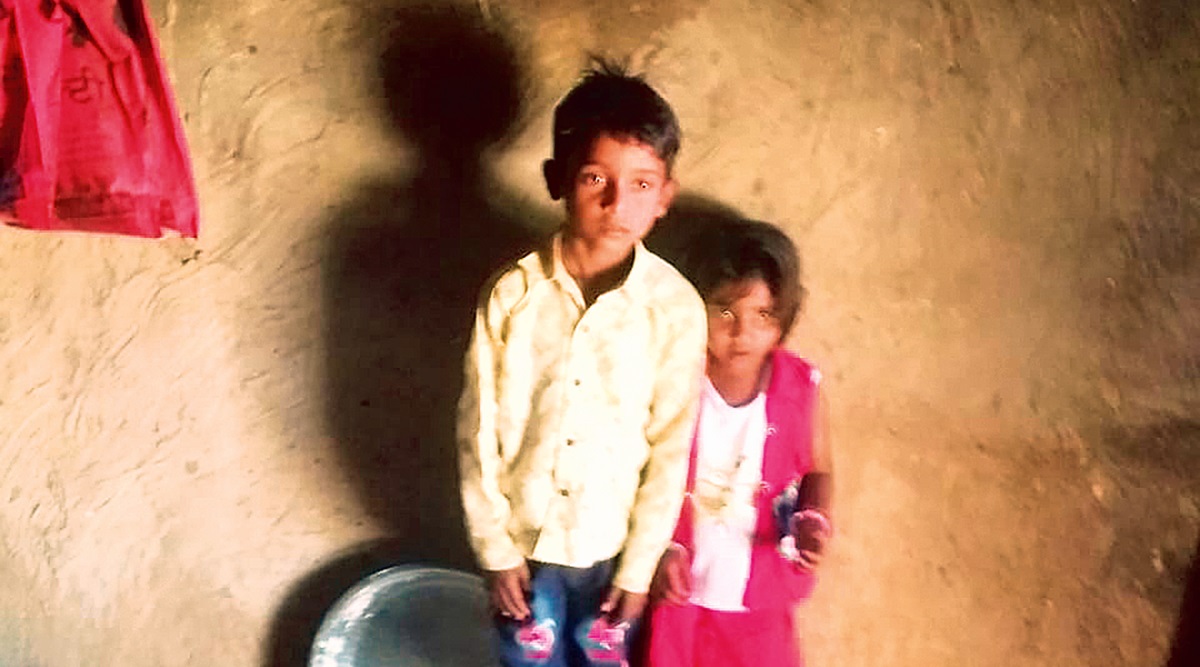 Halfway through their 9-km trek from their home in Sirohi to Jalore, Anjali (in red dress) and her grandmother collapsed. (Express photo)
Halfway through their 9-km trek from their home in Sirohi to Jalore, Anjali (in red dress) and her grandmother collapsed. (Express photo) Empty stomachs, parched throats, lonely desert, a woman and child, and 32 hours in the open, most of them under the cruel summer sun. Halfway through what was to be a 9-km, well-trod distance, the five-year-old was dead, of a reason unheard of in 2021 even in arid Rajasthan: thirst.
The postmortem said Anjali died of “severe dehydration”. Her grandmother, Sukhi Devi, 60, spent about a week in different hospitals. It is not clear how they ended up thus, or there. Sukhi says they had done the route often earlier; “the only difference was that this time Anjali forgot her water bottle”.
Union Jal Shakti Minister Gajendra Singh Shekhawat claimed the reason was different, questioning Chief Minister Ashok Gehlot as to why “Rajasthan ranks 29th among 33 states and union territories in terms of providing tap connections in rural areas”.
Neeraj Mathur, Chief Engineer (Project) with the Public Health Engineering Department (PHED), says there is no dearth of water in the Sirohi-Jalore region — what killed Anjali was that they were far from habitation. The nearest village from where she died is 1.5 km away.
Sukhi and Anjali had set off from home in Raipur in Sirohi on foot on the morning of June 5, to meet Sukhi’s youngest daughter Puja, who lives in Dhuliya in adjacent Jalore.
By road, it is a 19-km distance. But Sukhi took Anjali down a shorter, direct route, around 9-km long, that she had taken often.
At 4 pm on June 6, shepherd Nagji Ram discovered the two collapsed near Roda village in Jalore. Anjali was dead by then.
Nagji Ram alerted his son, Rai Chand Bhil, who called up Krishan Rajpurohit, the sarpanch of Surajwad, under which Roda falls.
Officials are trying to piece together the 32 hours after Sukhi and Anjali left home. Sukhi says they walked an entire day — “the same route… like I do every time” — spending the night on a hillock, before collapsing the next day. “It was very hot, the sun was strong,” she adds. It hit a high of 40 degrees Celsius that day.
The family says two days and one night was the usual time it took for Sukhi to cover the distance. “Roz ka aana jaana tha (We would travel every other day),” says Sukhi’s son Mahendra, the second of her three children.
For the past couple of years, Sukhi had been raising Anjali, her eldest daughter Ramila’s child.
Krishan estimates the two walked 4-5 km the first day, and when they reached the Roda hillock, decided to spend the night there. “No one lives there. The area has just dhorey (dunes) and hillocks. One can’t survive without water for two days, especially a child.”
Krishan says they offered Sukhi some water and called the swasthya mitra (health worker), who administered her first aid. Since most vehicles can’t negotiate the terrain, Sukhi and Anjali were carried some distance, to where police could reach.
The two were rushed to the Raniwara CHC. Dr Babulal Purohit, Block Chief Medical Officer, Raniwara, says Sukhi was then referred to Jalore district hospital, followed by Jodhpur Medical College.
Mahendra says doctors told them Anjali had “died of thirst”. In a statement, District Collector Namrata Vrishni said medical reports indicated the five-year-old had suffered “severe dehydration”. “Sukhi is fine now,” Vrishni said.
With Anjali’s death raising the heat on the state government, Chief Engineer Mathur points out that Roda gets water from a tubewell as well as the Narmada Canal — ensuring “90 litres of water per person per day”.
However, PHED data as of June 18 shows that only around 20 lakh of 1.01 crore families in rural Rajasthan get drinking water through taps. Jalore fares slightly better, with 26.3% of its rural households covered.
Says Rajasthan’s PHED Minister B D Kalla, “Tell me, what is the PHED’s fault? If someone is passing through a jungle, they should take their own water.”
He also asks why the Centre had cut its assistance for drinking water schemes for a desert state like Rajasthan, from 100% to 45% each by the Centre and state. “Villages have to bear the remaining 10%. Which village can bear 10%?”
- The Indian Express website has been rated GREEN for its credibility and trustworthiness by Newsguard, a global service that rates news sources for their journalistic standards.

